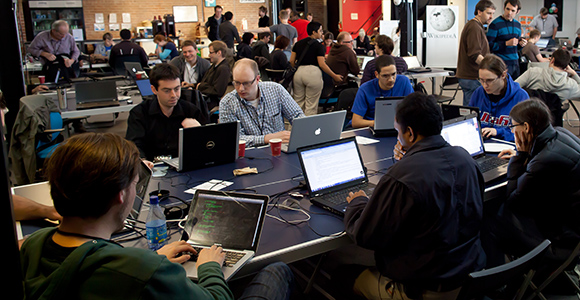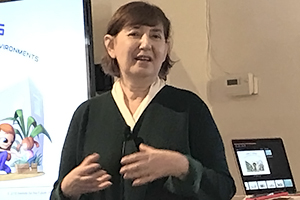
Wikimedia Foundation Hackathon (Photo Credit: Matthew Roth/Wikimedia Commons)
In the heart of the Silicon Valley, leaders from the booming region are talking about growing concerns over the workforce pipeline dealing with the dynamic and challenging conditions there.
“We are seeing the unemployment rate for the mid-career professionals in their 40s in the Silicon Valley go up,” said Marina Gorbis, executive director of the Institute for the Future (IFTF).
To help workers of all types get trained and retrained for jobs of the 21st century economy, California Community Colleges are putting in considerable effort to engage leaders in each region of the state.
The Institute was the symbolically perfect venue for the California Community Colleges' fifth-in-the-series Future of Work MeetUp held this week in Palo Alto. These “MeetUps” convene employer, workforce, community, civic, labor, and education leaders to share their insights about the future of work.
One important solution talked about was the proposed creation of a statewide online college aimed at serving workers who need to upgrade specific job skills and may not have the time or the money to attend one of the existing community colleges.
For Executive Vice Chancellor Van Ton-Quinlivan, the meeting and the input received were productive.
“We are continuing to receive a positive reception for the online college,” she said. “There is agreement that we must address the needs of our communities as the economy continues to adjust and this can be another tool to make us more agile as a system.”
In her presentation, she emphasized the creation of a flexible and affordable alternative like the online college has to be culturally appropriate that has good faculty interaction and the ability to help those workers who are not used to navigating online.
The Vice Chancellor reminded attendees that there are nine million Californians who are in need of upgrading their skill sets for middle-skill jobs and about half of whom are Spanish speaking.
The issue of the mid-career dislocated worker looms as a big problem in the Valley where some believe employers too often value youth over experience.
 Gorbis added she believes that algorithmic hiring that uses big data to evaluate individual candidates is discriminatory in favor of the cheaper, younger worker. She also pointed out that the skills gap and the lack of affordable housing in the Valley is causing another phenomenon.
Gorbis added she believes that algorithmic hiring that uses big data to evaluate individual candidates is discriminatory in favor of the cheaper, younger worker. She also pointed out that the skills gap and the lack of affordable housing in the Valley is causing another phenomenon.
“There are people living in campers right on the El Camino Real who work nearby but have nowhere to live,” said Gorbis.
As she looks to the future—which is what she does—Gorbis pointed out that since work has become so precarious for so many and that nearly half of California lives in or near poverty, we may need to rethink how we define the safety net.
“We have many people with no retirement, no health care coverage who are living day to day,” she said. “We need to have a serious discussion about how to build a safety net that reflects our times the way we did as a country in the 1950s and 1960s.”
Gorbis believes that conversations about the creation of an online community college were useful.
“We heard what works and doesn't work in online education which will be helpful as the Community Colleges moves forward with the idea.”
The Meetups will continue through April to create deeper employer engagement, broadened regional partnerships and innovative technology platforms that connect adult workers with up skilling options.
Sign up to attend the next Future of Work MeetUp happening near you to contribute to the conversation.

